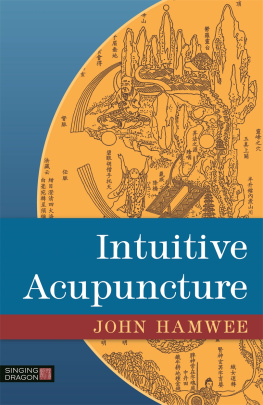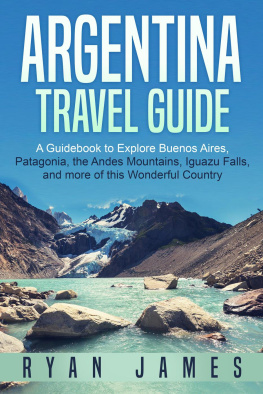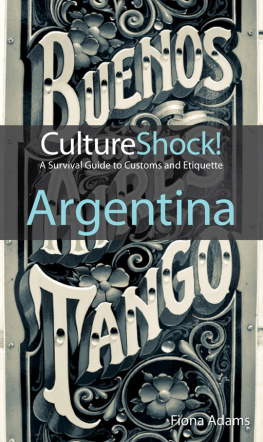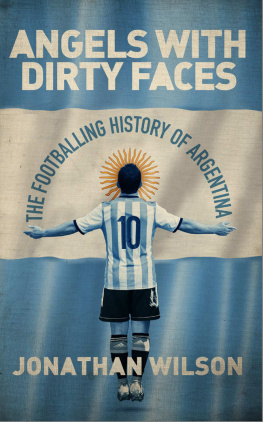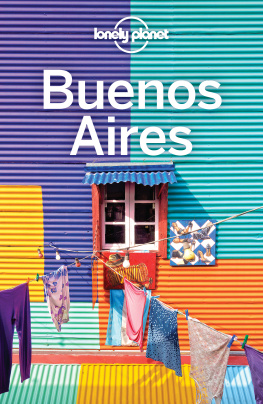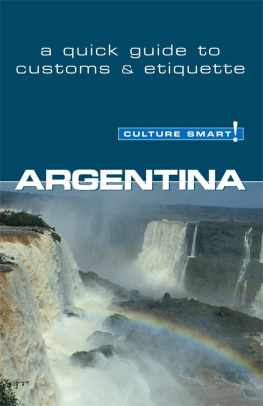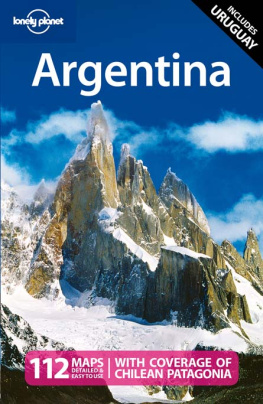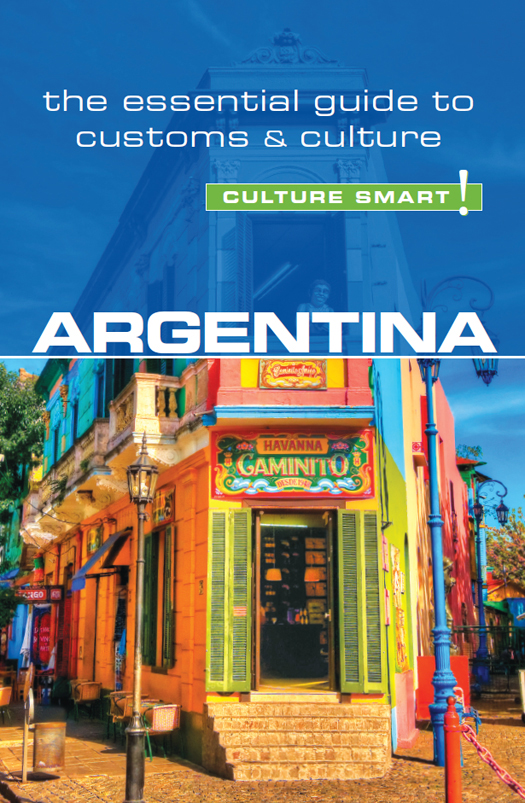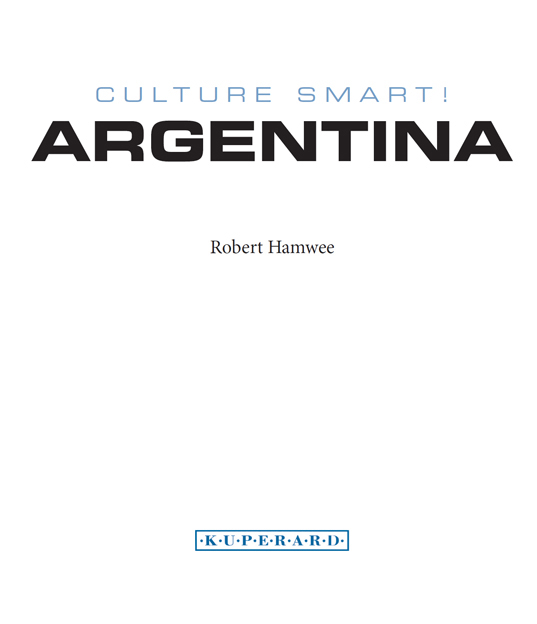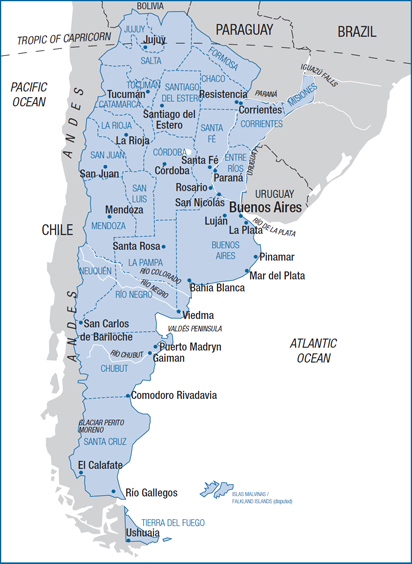Copyright 2015 Kuperard
Revised and updated edition 2015
All rights reserved. No part of this publication may be reprinted or reproduced, stored in a retrieval system, or transmitted in any form or by any means without prior permission in writing from the publishers.
Culture Smart! is a registered trademark of Bravo Ltd.
ISBN 978 1 85733 705 1
eBook ISBN: 978-1-85733-706-8
British Library Cataloguing in Publication Data
First published in Great Britain
by Kuperard, an imprint of Bravo Ltd
59 Hutton Grove, London N12 8DS
Tel: +44 (0) 20 8446 2440 Fax: +44 (0) 20 8446 2441
www.culturesmart.co.uk
Inquiries:
Series Editor Geoffrey Chesler
Design Bobby Birchall
Cover image: El Caminito (little walkway), the alley in the neighborhood of La Boca, Buenos Aires, that inspired the music for the famous tango Caminto, composed by Juan de Dios Filiberto. Alamy
Images on the following pages reproduced under Creative Commons Attribution-Share Alike 4.0 International license: Exekiels.
Reproduced under Creative Commons Attribution-Share Alike 3.0 Unported license: Helge Hifdt.
Creative Commons Attribution-Share Alike 2.5 Generic license: Loco085.
Creative Commons Attribution-Share Alike 2.0 Generic license: (top) Fuentes/Fernandez.
Images .
Image iStock.
v3.1
About the Author
ROBERT HAMWEE is a training and management consultant who was born and brought up in Argentina before moving to the UK at the age of twenty-three. He has a degree in music and business management and speaks six languages. He is currently a learning solutions lead for Accenture, and was previously founder and director of Aliquot Consulting Group, specializing in international and cross-cultural training and business issues.
The Culture Smart! series is continuing to expand. For further information and latest titles visit
www.culturesmart.co.uk
The publishers would like to thank CultureSmart!Consulting for its help in researching and developing the concept for this series.
CultureSmart!Consulting creates tailor-made seminars and consultancy programs to meet a wide range of corporate, public-sector, and individual needs. Whether delivering courses on multicultural team building in the USA, preparing Chinese engineers for a posting in Europe, training call-center staff in India, or raising the awareness of police forces to the needs of diverse ethnic communities, it provides essential, practical, and powerful skills worldwide to an increasingly international workforce.
For details, visit www.culturesmartconsulting.com
CultureSmart!Consulting and CultureSmart! guides have both contributed to and featured regularly in the weekly travel program Fast Track on BBC World TV.
contents
Map of Argentina
introduction
Argentina is a country that embraces much more than gaucho, tango, polo, and football. Very unlike its Latin American neighbors, it has evolved in a distinctive way, and is quite different from the expectations many visitors have of a stereotypical Latin American destination.
The Argentinians have developed a style, a language, and a way of life that are all their own. They are a passionate, friendly, extroverted, and, particularly in Buenos Aires, vociferous people who have experienced the hardships of cruel economic downturns and hyperinflation of gargantuan proportions. For Argentinians there have also been golden eras, when traveling abroad was commonplace and, ironically, cheaper than staying at home.
Argentinians are stylish, sophisticated, and quite homogeneousnot the multicultural society we find in many other countries. Neither very disciplined in their everyday life, nor great team players, they are, however, a nation of hardworking and resilient people whose character has been molded by external factors rather than driven by internal values.
The waves of immigrants that arrived in the twentieth century, mainly from Europe, brought with them a wealth of knowledge and culture that played a crucial role in the development of art, literature, and general lifestyle. Buenos Aires, with one of the worlds largest opera houses, as well as museums and galleries, has produced writers and poets of distinction, and has gained a reputation as one of Latin Americas great cultural centers.
After the Second World War, Argentina underwent a series of political upheavals, culminating in a coup in 1976 that brought one of the worst dictatorships in its history. The war with Britain in 1982 over the Falkland Islands, or Islas Malvinas, contributed to the governments own downfall and paved the way, albeit aided by a sad turn of events, for the restoration of democracy.
Still facing political and economic problems, the Argentinians today seem to have gained control of their own destiny. This, however, has been marred by a series of questionable economic policies and tense relationships with foreign investors, leading to pessimism about their governments ability to manage the ailing economy. Many look forward to policy changes in 2016 with more hope. Despite these problems, the Argentinians welcome visitors with open arms.
This book deals with the many facets of the Argentinian way of life. It has been designed to give you an insight into their social and business habits, culture, customs, and values. We hope to share with you our experiences of this great nation, which always seems to bounce back from adversity with unique, life-affirming joie de vivre.
Key Facts
| Official Name | Repblica Argentina |
| Capital | Buenos Aires | (Short for Puerto de Nuestra Seora Santa Mara del Buen Aire) |
| Main Cities | Buenos Aires (pop. 3 million, city only), Crdoba (pop. 1.345 million), Rosario (pop. 1.23 million), Mendoza (pop. 880,000), La Plata (pop. 724,000) |
| Area | 1,068,302 sq. miles (2,766,890 sq. km) | Excl. islands in the South Atlantic and a portion of the Antarctic |
| Geography | Argentina is located on the Southern Cone of South America. | Bordering countries: Bolivia, Paraguay, Chile (divided by the Andes mountain range), Brazil, and Uruguay |
| Climate | Ranging from hot subtropical in the north to cold Antarctic in the south |
| Population | 32.6 million |
| Population Density | 13.2 inhabitants per sq. km |
| Language | Castellano (Castilian Spanish) |
| Religion | The official religion is Catholicism. | Roman Catholic 93%, Protestant 2.5%, Judaism 2%, other 2.5% (incl. Afro-Caribbean religions mainly of Brazilian influence) |
| National Holidays | Independence Day, July 9; Day of the May Revolution, May 25 |
| Government |


